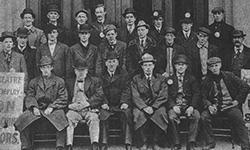Are You an Independent Contractor or Employee?
Some companies tell workers they are independent contractors even when they are truly employees. They do this to avoid following basic labour laws and paying employee benefits and other costs. This is called misclassification of workers. Know what steps to take to determine your status as a worker and understand which laws protect you.
KNOW THE DIFFERENCE
Employment status (whether we are employees or independent contractors) directly affects our entitlement to basic rights such as minimum wage, overtime pay, health & safety protections, job-protected leaves, human rights and the right to bargain collectively and join a union.
Employment status also affects our right to Employment Insurance (EI), Canada Pension Plan (CPP) and Workplace Safety and Insurance (WSIB) or workers’ compensation as it is often called. It affects how we are treated under the Income Tax Act. Employment status also affects what we can do when wages go unpaid or problems happen at work.
You may be an EMPLOYEE when at least some of the following describes your work:
- You receive training from the company.
- The company supervises your work.
- You do not have control over your work, hours or rate of pay.
- You work with tools or equipment that the company gives you.
- Your boss is the one who makes a pro t or loss. You don’t pay the costs of running the business or get the pro ts over and above your wages.
- Your work is clearly part of the business.
You may be an INDEPENDENT CONTRACTOR or SELF-EMPLOYED when some of the following describes your work:
- You control how your work is done. You may hire other people to assist in doing the work and you, not the company, direct their work.
- You can freely negotiate your pay and when your work has to be done.
- You own and are responsible for some of the tools or equipment you use to work.
- You take the pro t or loss from the work. If there is a pro t, you receive it, and if there is a loss – then you are responsible for the loss.
- You are not part of the business. You have a freedom to choose who you work for and can work for different companies at the same time.
What if you still don’t know the difference?
Sometimes you can’t tell whether you are an independent
boss might supervise your work, but you use some of your own tools. In these cases there is no one correct “answer”. Call the Workers’ Action Centre for information on resources to help you determine your employment status.
KNOW THE LAWS THAT PROTECT YOU
Understand how the law affects you as an employee or an independent contractor. This information will help you decide which steps to take and who to contact if there is a problem at work.
Ontario Human Rights Code
Prohibits workplace discrimination and harassment based on race, colour, ethnicity, country of origin, age, sex, sexual orientation, disability, marital and family status, religion and citizenship and pardoned criminal offences. A worker who believes they have faced discrimination and harassment based on a human rights ground can le a complaint with the Human Rights Tribunal.
Ontario Health and Safety Act (OHSA)
Employees and independent contractors both have rights and responsibilities for healthy and safe working conditions.
Employment Standards Act (ESA)
As an employee you have the right to earn at least minimum wage and receive overtime pay, vacation pay and public holidays. You have access to job-protected parental leave. Among other protections, you may receive termination and severance if you are red from work. Independent contractors do not have these rights to basic employment standards.
Employees can make a complaint to the Ministry of Labour if they don’t get paid the wages they are owed. There is no cost to do this. Independent contractors have to go to court, pay certain fees and complete complicated legal documents. If a worker loses their case in court they might even have to pay some of the legal costs of the person they complained against.
Canadian Pension Plan (CPP)
The CPP is supposed to provide us with a pension plan when we retire or disability bene ts if we are unable to work. When you are employed, you and your employer pay into the CPP. If you are an independent contractor then you alone have to make payments to CPP.
Workers Safety and Insurance Board (WSIB)
When you are an employee, your employer pays premiums, like insurance payments, to ensure that you will be compensated if you have been injured or become sick at work. If you are an independent contractor you are responsible for paying for your own WSIB coverage.
Employment Insurance (EI)
If you are an employee, you and your employer make payments to EI. When you lose your job, are unemployed or require special bene ts, you can apply for EI bene ts. If you are an independent contractor, you are not entitled to EI when you are unemployed. However, you may be eligible for special bene ts (maternity, sickness, parental or compassionate care only). Participation in these speci c bene ts is voluntary. To become eligible for these bene ts (that will begin in January 2011) you must:
- enter into an agreement with the Commission and begin paying into EI (application on-line or through Service Canada); and
- be a Canadian citizen or a permanent resident of Canada
Income Tax
Both employees and independent contractors have to pay income tax. As an employee, your employer has to deduct income taxes from each pay cheque and give that money to the government on your behalf. When you are an independent contractor, you declare your income and pay taxes to the government directly.
Independent contractors can deduct more expenses related to their job (for example, gas or cell phone costs) which means they sometimes pay less taxes. Employees can sometimes deduct a limited number of job-related expenses for tax purposes.
It’s important to be sure about your employment status. If you have led your taxes as an independent contractor and declared expenses related to the work you do, you may have to repay some taxes related to these deductions if you realize that you are really an employee.
PROTECT YOURSELF
Even if you sign a contract saying you are independent contractor, you may not be. And, your employer cannot simply change your employment status by paying you like an independent contractor. What determines whether you are an employee or an independent contractor is how the work is done. If you sign a contract that says you are an independent contractor when you are truly an employee, you should not lose your rights as an employee.
- When you are asked to sign a contract, ask for some time to look it over rst so that you fully understand what the contract says. This might not be possible. Your boss might put pressure on you to sign the contract without looking at it thoroughly.
- Write down the details of your work: dates, hours, pay you received and details about the work you do every day. If you need to ask for your overtime pay, vacation pay or even minimum wage, it will help to have this documentation.
- It is illegal for your boss to re you for speaking about your rights, but many workers get red when they speak out. This is called a reprisal. Good documentation of all details of your work may be helpful later.
- Talk to other workers. Find out if they signed the same contract. Attend a Workers’ Action Centre info session as a group to learn how you can protect yourself.
- If you are owed wages, write a letter demanding what you are owed. Give your boss a deadline.
- If you are red, forced to quit or laid off, you may be eligible for Employment Insurance. Your detailed records will help when applying for EI benefits.
- File a complaint at the Ministry of Labour. It may be difficult to prove that you are an employee. Contact the Workers’ Action Centre for assistance.
Steve is an electrician. He worked for a company for over a year. He was treated as an employee. After a brief layoff, Steve returned to work. Only this time the boss said that Steve was now an independent contractor. The company stopped paying EI, CPP, holiday pay, vacation pay and deducting taxes. The boss never told him why his employment status changed and he never signed an agreement with Steve and his coworkers. Steve believes he is not a contractor and he does not understand what the employer means when he says Steve is a subcontractor. Many workers like Steve are really employees that have been misclassified.
GET SUPPORT
Workers’ Action Centre
Call us at the Workers’ Action Centre for more information on your rights and support to make a plan. (416) 531-0778 or www.workersactioncentre.org
Ministry of Labour
To find out more about ling a claim for unpaid wages call 1-800-531-5551 or go to www.labour.gov.on.ca.
Ministry of Labour, Occupational Health and Safety Branch
For information on health and safety at work. Call 1-800-268-8013 or go to www.labour.gov.on.ca/english/
Workers Safety and Insurance Board (WSIB)
For information on forms, claims, bene ts and other inquires please visit www.wsib.on.ca/wsib/wsibsite.nsf/public/Workers
or call 416-344-1000 or 1-800-387-0750
Human Rights Legal Support Centre
Provides human rights legal services if you feel you have experienced discrimination. Toll Free 1-866-625-5179 or www.hrlsc.on.ca
Canada Pension Plan (CPP)
Please go to www.servicecanada.gc.ca/eng/isp/cpp/cpptoc.shtml for answers to general questions on your bene ts under the CPP.
Service Canada
For information on your EI and other income bene ts when you are an employee or independent contractor. Call 1-800-206-7218 or visit www.servicecanada.gc.ca
Revenue Canada (CRA)
For more information on your employee status and how to claim your taxes. Call 1-800-959-8281 http://www.cra-arc.gc.ca/E/pbg/tf/t777/t777-09e.pdf


